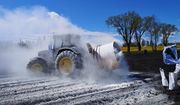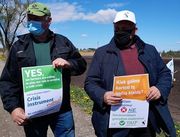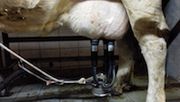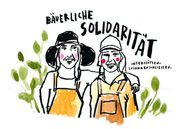EMB Newsletter May 2020
Newsletter as PDF
Contact
EMB - European Milk Board asbl
Rue de la Loi 155
B-1040 Bruxelles
Phone: +32 - 2808 - 1935
Fax: +32 - 2808 - 8265
Dear dairy farmers, dear fellow campaigners,
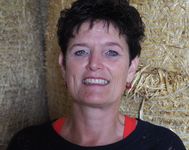
No farmers, no food
Today the world is governed by fear. The fact that we all live in fear is, among other things, a direct conse-quence of how "we" decided some decades ago that the way forward would be globalisation: we have interwoven our economic flows to the greatest possible extent. We thought it would be beneficial to all of us. For the sake of simplicity, "we" forgot that globalisation also entailed risks.
The reality is now hitting us hard. At the moment, we are facing one of the most severe economic crisis of all times, as globalisation has enabled a virus to spread like wildfire all over the world. In the past, governments regarded their food supply as the most important sector for survival. It is obvious that this way of thinking is no longer part of the DNA of today’s European heads of state and government: as in every other primarily geopolitical crisis in the last decade, they support the processing industry. Farmers’ incomes are ignored, as ever. And in the current reality that is a very dangerous political decision. No farmers, no food.
In the Netherlands, we notice another development. Now that the first clouds of dust are dispersing around the virus, other elements are resurfacing: fear is being instilled by the opponents of livestock farming. First these people thought of eliminating livestock farming by exploiting alleged over-fertilisation – totally constrained by Brussels’ strict rules. Then the livestock farmers were criminalised in the climate debate; and now, as neither that has produced any satisfactory results, the coronavirus has been hijacked. The virus would hit harder in regions with a high density of livestock and would have, for instance, nothing to do with the carnival festivities in the same regions or industrial air pollution.
A renowned professor of Utrecht University, Dick Heederik, immediately rejected as nonsense the assertion that there is a link between particulate matter from livestock farming and public health, describing the "scientific" sources as untrustworthy. However, the publication in a widely-read newspaper will make the reporting have a long-lasting effect. All the more so, because our Minister of Agriculture Carola Schouten asked the RIVM (National Institute of Public Health and the Environment) to study this – a political howler that has already condemned livestock breeding in public opinion even before the study has started. Previous studies have never shown a causal link between livestock breeding and lung diseases. That is of no consideration for the opponents of livestock farming. There are simply too many animals, so animal husbandry has to pay.
Fear – the worst adviser, in addition to incompetent, emotional politicians and decision-makers and biased media. What the world needs now is cool-headedness and science. No spotlight seekers, no witch hunt. To ensure that the consequences of COVID-19 do not plunge the world into even more chaos and famine, which we can prevent with a cool head.
No farmers, no food. I hope that by continuing to inform the European Commission and the stakeholders, EMB will be able to draw the attention of the political decision-makers in time to the risks they are now taking. It is know time to change the way we are heading in order to have enough farmers after this crisis to feed our people.
Sieta van Keimpema, Vice-President of the EMB
Major European milk powder demonstrations with an appeal to the European Commission: “Let’s implement a volume reduction programme together!”
Voluntary production cuts: yes – storage aid: no
Milk crisis due to coronavirus?
Germany: discussions about volume reduction – dairy industry associations and farmers’ union against volume reduction
Let’s implement food sovereignty together, here and now!
Impressum
European Milk Board asbl
Rue de la Loi 155
B-1040 Bruxelles
Phone: +32 2808 1935
Fax: +32 2808 8265
E-Mail: office@europeanmilkboard.org
Website: http://www.europeanmilkboard.org

